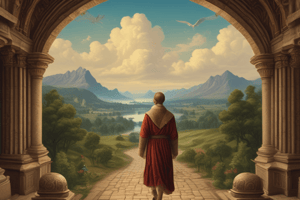Podcast
Questions and Answers
What does the term 'Renaissance' refer to?
What does the term 'Renaissance' refer to?
- A period of renewed interest in classical culture (correct)
- A movement for religious reform
- A type of painting
- A period of artistic decline
During what period did the Renaissance take place?
During what period did the Renaissance take place?
1300-1600
What is Humanism?
What is Humanism?
A Renaissance intellectual movement focusing on human potential and achievements.
What does the term 'secular' mean?
What does the term 'secular' mean?
What is a Patron?
What is a Patron?
What is perspective in art?
What is perspective in art?
What is the vernacular?
What is the vernacular?
What is Utopia?
What is Utopia?
What is the Printing Press?
What is the Printing Press?
What is the Gutenberg Bible?
What is the Gutenberg Bible?
What is an indulgence?
What is an indulgence?
What was the Reformation?
What was the Reformation?
Who was Martin Luther?
Who was Martin Luther?
What is the Peace of Augsburg?
What is the Peace of Augsburg?
What does it mean to annul something?
What does it mean to annul something?
What is predestination?
What is predestination?
What is Calvinism?
What is Calvinism?
What is theocracy?
What is theocracy?
What does the word 'Anabaptist' mean?
What does the word 'Anabaptist' mean?
What did the Jesuits focus on?
What did the Jesuits focus on?
What was the Council of Trent?
What was the Council of Trent?
What was the Act of Supremacy?
What was the Act of Supremacy?
What did Machiavelli write?
What did Machiavelli write?
Who were Erasmus and More?
Who were Erasmus and More?
What did Rabelais believe about human nature?
What did Rabelais believe about human nature?
What is the effect of the Printing Press?
What is the effect of the Printing Press?
What did the Council of Trent conclude about the Church's interpretation of the Bible?
What did the Council of Trent conclude about the Church's interpretation of the Bible?
Who was Marguerite of Navarre?
Who was Marguerite of Navarre?
Flashcards are hidden until you start studying
Study Notes
Renaissance
- A transformative period in European history lasting from approximately 1300 to 1600, marked by a revival of classical culture influencing art and learning.
- Emphasis on humanism, showcasing potential and achievements of individuals.
Key Concepts in Renaissance
- Humanism: An intellectual movement focused on classical texts highlighting human potential and achievements.
- Secularism: An approach prioritizing worldly concerns over spiritual ones.
- Perspective: A technique in art that creates the illusion of three dimensions on a flat surface.
- Vernacular: Common language spoken by people, used by writers to reach wider audiences.
Printing Revolution
- Printing Press: Revolutionized communication by allowing mass production of written material.
- Gutenberg Bible: The first significant book printed using movable type, symbolizing the spread of literacy and ideas.
- Effects included increased literacy, rise in vernacular literature, and religious reforms.
Religious Transformations
- Indulgence: A church practice pardoning individuals from punishment for sins, leading to controversy and reform.
- Reformation: A religious movement in the 16th century challenging the Catholic Church’s authority, resulting in new Protestant denominations.
- Lutheranism: Founded on Martin Luther's principles; emphasized forgiveness, faith, and scriptural authority.
- Protestantism: Unifying term for various Christian groups arising from the Reformation.
- Council of Trent: A crucial assembly of church leaders to address reform and clarify doctrines.
Notable Figures and Families
- Medici Family: Influential patrons in Florence, playing a pivotal role in the Renaissance.
- Machiavelli: Philosopher known for "The Prince," examining political power and leadership.
- Erasmus and Thomas More: Key Christian humanists advocating for reform and education.
- John Calvin: Founder of Calvinism, promoting ideas of predestination and a disciplined Christian life.
- Henry VIII: English monarch whose split from the Catholic Church led to the creation of the Church of England.
Key Events and Terms
- 95 Theses: Martin Luther’s criticisms of indulgences, catalyzing the Reformation.
- Peace of Augsburg: A 1555 agreement allowing German rulers to choose their state's religion.
- Act of Supremacy: Declared the English monarch as the head of the Church of England, severing ties with the Pope.
- Predestination: A Calvinist belief that God has predetermined who will be saved, fundamental in shaping Protestant theology.
Arts and Literature
- Renaissance Artists: Focused on realism, humanism, and classical themes; notable artists include Donatello and Raphael.
- Rabelais: His work "Gargantua and Pantagruel" explored humanism’s themes in vernacular French.
- Shakespeare: Analyzed human nature and society through plays, examining themes of flaws and virtues.
Women in Reform and Renaissance
- Prominent figures like Marguerite of Navarre, Katherina Zell, and Katherina von Bora challenged societal norms and contributed to the discourse surrounding women’s roles during the Reformation.
Final Summation of Reformation Outcomes
- Led to a flourishing of Protestant churches, decline of the pope's unifying power in Europe, empowerment of monarchs, and diversification of Christian beliefs.
Studying That Suits You
Use AI to generate personalized quizzes and flashcards to suit your learning preferences.




